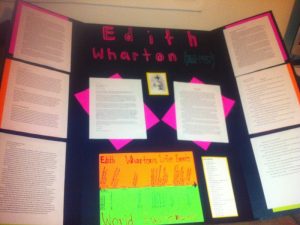When I wrote The Brave Escape of Edith Wharton, I was hoping the book would be discovered by high school teachers and used to introduce a new generation of readers to Edith Wharton. You can imagine my delight when Diana Morón, a sophomore at Porterville High School in Porterville, California, introduced herself to me by e-mail last November and asked for help with an author she was researching for an English assignment: Edith Wharton!
Since each student in Diana’s class was studying a different author, Diana would be exploring two of Wharton’s novels (The House of Mirth and The Age of Innocence), Wharton’s life, her writing style, and the various influences on her writing…all on her own! It was the perfect opportunity for me see a young reader’s first solo encounter with a wonderful but difficult author.

Diana Morón
By the time Diana completed her “huge class project,” she recognized that Wharton’s society novels came out of her life experience, but she was intrigued to learn how autobiographical Ethan Frome (set in a poor New England town) was. She was also surprised to learn of Wharton’s “caring and generous” charity work in Paris during World War I. She wondered if Wharton “desired to have any children of her own” and if Teddy ever made the “reasonable” assumption that his wife might be “having numerous affairs since she spent a large amount of time with other men.” She astutely saw the parallel between Newland Archer’s decision not to marry Ellen Olenska when the opportunity finally came in The Age of Innocence and the fact that Walter Berry and Edith Wharton never married when the way opened up for them. Diana puzzled over both.
“You would think…upper-class people to be well-mannered and proper,” Diana observed. “However…people try to hide.” “It was better to keep quiet…and try to follow the crowd.” She saw the tension between Ellen Olenska who “is herself, and doesn’t live just to please people” and May Welland whom she found “too innocent, calm, well-mannered” and who “doesn’t express any thoughts or feelings.”
Kudos to Diana for taking on such a challenge. And a suggestion: Try re-reading one of these two Wharton novels in five or eight or ten years. Even if you remember the plots and the characters thoroughly, you will find the novels brand new. Which is why they are classics, still in print, still read and enjoyed year after year!
—
The Brave Escape of Edith Wharton
By Connie Nordhielm Wooldridge
Edith Wharton, author of Ethan Frome, The House of Mirth, and other acclaimed novels, was born into a wealthy New York City family during the Gilded Age. In fact, she was a Jones of “keeping up with the Joneses” fame. This anecdote opens Woodridge’s biography of an astonishing life. Beginning in childhood, Edith found ways to escape from society’s and her family’s expectations and follow an unconventional, creative path. Unhappily married and eventually divorced, she surrounded herself with the cultural creatives of her day, mostly male friends. To escape the obligations of New York City high society, she spent much of her life in Paris and was recognized by the French government for her work establishing four charities during World War I. Her literary and personal life, her witty and incisive correspondence, her fondness for automobiles and small dogs–all are detailed in this vibrant account of a woman well ahead of her time. Includes photographs, a bibliography, source notes, and an index.
—
Connie Nordhielm Wooldridge, Author

- Just Fine They Way They Are (Calkins Creek, March 1, 2011)
- The Brave Escape of Edith Wharton (Clarion Books, 2010)
- Thank You Very Much, Captain Ericsson! (Holiday House, 2005; Berndtsdotter Books, 2012)
- When Esther Morris Headed West (Holiday House, 2001)
- The Legend of Strap Buckner (Holiday House, 2001)
- Wicked Jack (Holiday House, 1995)
Speaker / Presenter
Connie is an experienced speaker and presenter who enjoys sharing her passion for writing and her experience as a writer with readers and writers of all ages. She has presented to students, community, civic and professional organizations, writing groups, library audiences, and seniors – wherever book lovers gather!
>> More Information About Connie Speaking and Presenting



